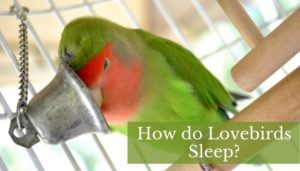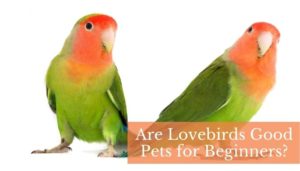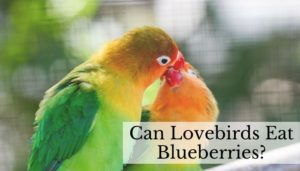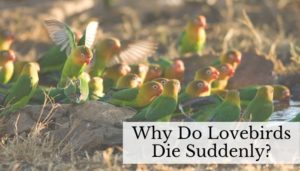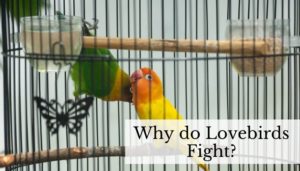A balanced diet that provides all of its nutritional needs is key to a long life when it comes to your pet lovebird. The thing is, finding the perfect balance can be tricky, especially for birds known for eating whatever you feed them, even if they’re not supposed to.
Luckily, coming up with a good diet plan can be as simple as making sure your lovebird is also getting its healthy fill of fresh vegetables.
But what vegetables, you may ask? What Vegetables Can Lovebirds Eat? Lovebirds can eat cucumber, cabbages, broccoli (opt for raw), spinach, carrots, kale, artichokes, green beans, pumpkins, radish, sweet potatoes (cooked), watercress, and eggplant.
In this article, we will go over a list of the vegetables that parrots can eat, what benefits they provide, and how to feed your pet bird better.
Let’s begin.
Why Feed Vegetables to Your Lovebird?
Unless you’ve been living under a rock, then you should be aware of the many benefits that a fresh mix of vegetables can provide.
Much like us humans, lovebirds also benefit from these, helping fill nutritional gaps that a diet consisting of pellets and birdseed might not be able to provide.
Furthermore, introducing vegetables into your lovebird’s diet is also a good way of adding variety, which your bird should get used to to help stop it from developing a particular taste.
Lastly, most of these vegetables can be found in the kitchen, adding healthy options should you find yourself out of bird formula.
Additional reading: Can Lovebirds Eat Blueberries?
List of Vegetables Your Lovebird Can Eat
Cucumber
Cucumbers are one of the most commonly found vegetables in any kitchen, so feeding them to your pet should be relatively easy.
The good thing about cucumber is that it’s rich in vitamin C and K, and its water content makes it perfect for hotter days.
Chinese Cabbage (Bok Choy)
Another vegetable that’s easily accessible is Chinese cabbages or Bok Choy. These vegetables are incredibly rich in calcium and can help bolster your pet’s calcium intake.
On top of that, Chinese cabbages hold a few other nutritional benefits that will surely boost your pet’s health.
Broccoli
When it comes to feeding broccoli to your lovebird, opt for raw. This is because broccoli holds plenty of heat-sensitive nutrients that may dissolve in boiling water.
Fed raw, however, broccoli is an excellent source of vitamins A, B, and D for your bird, boosting your pet’s fitness and vision.
Spinach
Dark leafy green vegetables like spinach are among the best veggie additions to your bird’s diet. These tend to pack significantly more vitamins and minerals than other vegetables.
For example, spinach is brimming with antioxidants and nutrients, both of which will protect your bird’s health and immune system. In addition, spinach is pretty tasty for birds.
Artichoke
Aside from being packed with plenty of health benefits, artichokes also have the benefit of providing mental stimulation for your lovebird, all while it keeps itself occupied, happy, and healthy. Plus, you can even play with your lovebird and use the artichoke as a reward. X`
Green Beans
Green beans are excellent sources of fiber, making them a great addition to any lovebird diet. Additionally, they’re also munchy, so your lovebird will surely enjoy munching on them all day long!
Pumpkin
Pumpkin seeds and pumpkin flesh contain healthy fats and protein that benefit your lovebird’s health.
Furthermore, pumpkins are also super tasty, so mixing a small slice or two will add some welcome variety to your pet’s daily diet.
Radish (Red and White)
Whether red or white, the radish is a healthy vegetable that’s high in vitamin C, therefore giving your lovebird’s immune system a nutrient boost. This way, your lovebird can enjoy increased protection against common avian illnesses.
Sweet Potatoes (Cooked)
When feeding sweet potato to your bird, make sure that it’s properly softened and cooked, as uncooked ones can be harmful to your pet.
The great thing about sweet potatoes is they are low on the glycaemic index, meaning they are deficient in calories and therefore healthier for you and your bird.
Watercress
Watercress is another excellent calcium source essential for a bird in terms of its feathers and bones. Aside from that, watercress is also filled with vitamins A and K!
Eggplant
As a vegetable, eggplant comes with the benefit of vitamin A, which is very instrumental in every part of your bird’s body.
For example, vitamin A can help form new cells, all while keeping the ones your bird already has more active and robust.
Additional reading: Why do Lovebirds Fight? Everything You Need to Know
How to Feed Vegetables to Lovebirds?
Assuming your lovebird isn’t particularly picky (some birds are), then it should be easy to feed a good mix of vegetables to it, and it all starts with getting your pet interested in the food.
Of course, lovebirds are animals that thrive in stimulation, so the best thing you can do is make the food appealing to your pet.
There are plenty of ways to do this, but the easiest one is picking a distinctly colored plate for the vegetables. When you keep using this plate, your bird will start to recognize it, eventually associating it with good and tasty food.
Another strategy is to treat it like playtime, such as making the food colorful or hanging them on a string so your lovebird can nibble on it at their leisure.
Of course, setting aside some time to hand feed your bird will also significantly help, especially if your pet already knows and trusts you.
That said, know that it’s essential never to feed your lovebirds any more vegetables than you need them to. Stick to at least 25% of their diet, as going over can provide them with an excess of nutrients their body doesn’t need. Now and then, throw some fresh fruit in the mix as well.
Additional reading: Why Do Lovebirds Die Suddenly?
Vegetables Your Lovebird Should Avoid
Unfortunately, not all vegetables are safe for lovebirds. Here are some ones you should avoid:
- Garli
- Onion
- Dates
- Raw Potatoes
- Green Tomatoes
- Canned vegetables (high sodium content)
- Rhubarbs
Beyond this, doing prior research or asking a professional before feeding something new to your bird should be standard practice that you should make into a habit.
Conclusion
Just like us, lovebirds will find plenty to enjoy in eating vegetables, mainly when you feed them a healthy amount consistently.
Fresh and clean vegetables are also a significant step on the path to the right nutrition and will benefit your pet’s overall health and well-being in the long run.

